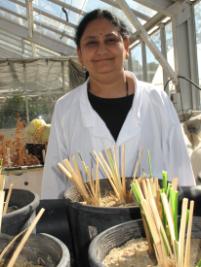Seeking CQUni's help is no 'waste' of time for researcher
Published on 16 August, 2010
Hazardous waste and its disposal is increasingly becoming a problem globally, according to visiting Endeavour Research Fellow Dr Snehalata Nadiger.
Dr Nadiger is the Head of Department of Biotechnology, New Horizon College of Engineering, in Bangalore, India, which is affiliated with Visvesvaraya Technological University.

Endeavour Research Fellow Dr Snehalata NadigerShe has been working with CQUniversity's Dr Nanjappa Ashwath, Associate Professor, Centre for Plant and Water Science, for the past four months on a project looking at phytoremediation (using plants for remediation) of hazardous waste sites in Bangalore, India.
"In order to execute this project effectively we decided to take help from an expert in this field - Dr Ashwath - and received backing from the prestigious Endeavour Research Fellowship which offers deserving projects to Indians every year," Dr Nadiger explained.
"Here at CQUniversity, I have tried to study the effect of heavy metal, chromium, on plants like Brassica juncea and Vetiver grass. These studies were done in the glasshouse as well as in the lab (tissue culture).
"The advantage of selecting these two plants is that they have been originally present in India and also they are known as multi-element accumulators."
Another aspect of this project has been to explore plants growing naturally in serpentine soils, for which Central Queensland is well-known. The serpentine soils contain heavy metals like chromium in high concentration.
"The results obtained during these experiments are very promising. Normally plants are seen surviving in soils containing 50 ppm of chromium, but our results showed that Brassica are able to grow and also accumulate about 1000 ppm of chromium."
The information gained by this study will eventually help Dr Nadiger implement the project.

